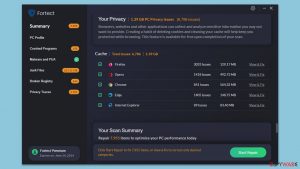Firewalls
Firewall is a software or hardware utility which is designed specifically for the network security. It monitors all the incoming and outgoing traffic on the private network and makes sure that no unauthorized connection from the outside occurs. Usually, this software is considered an extra layer of protection which helps keeping hackers and other Internet threats at bay. As computer experts recommend, it should be used in conjunction with these security programs:
As cyber infections are becoming increasingly aggressive each day, firewall has become a must-have utility capable of protecting computers and other devices from a variety of attacks. No matter that the most popular way to ensure the protection is to obtain a reliable anti-virus with anti-spyware system and keep them up to date, relying merely on these programs is rather naive and risky. Some viruses are capable of bypassing even the most sophisticated virus-fighting tools and infiltrating the system without being noticed, so firewall is considered another useful computer protection utility.
How do firewalls function
As already mentioned, firewalls block unauthorized connection and make sure that the private network is secure. In other words, all the data that comes in and out of the private computer is filtered through the firewall and inspected according to specific security standards. If the connection is suspicious and does not correspond to predetermined standards, it will be blocked automatically. Another important characteristic of firewalls is that they provide the user with more control and administrative power over the computer‘s security. Depending on a firewall, it can display feedback about the type and extent of the traffic and allow the user to manage it manually. For that, you will need to set up specific rules for the firewall to follow. Essentially, you can “deny“ or “accept” particular inbound and outbound traffic according to your needs. So, if you see some suspicious process in your inbound list of connections, you can deny it and block it instantaneously. The same can be done with the outbound traffic as well. However, generally, the default firewall settings are designed to detect the potentially dangerous traffic and to terminate it automatically, so you do not have to worry about the configuration.
Types of firewalls
There are two types of firewalls. They can either be software-based or hardware-type mechanisms. Let us discuss each of these mechanisms in more detail:
Hardware firewalls are often integrated into the broadband routers or can be purchased separately. These appliances are the stepping stones between the private and the worldwide network. Usually, firewalls designed for the private use can take up to 4 devices, while the larger corporate computer networks use more powerful, business-oriented equipment. For the best protection, several firewalls from different manufacturers can also be applied.
Firewall software is a different solution as it does not require purchasing additional equipment. All you have to do is download and install it just like any other application. Of course, there are in-built firewalls that come with your device, though an extra layer of protection is always a recommended option. Firewall software can be customized and new rules can be created to protect your computer from the infiltration risks. Both, software and hardware mechanisms can be equally effective. Of course, combining these two together with an addition of a reputable antivirus utility is the most recommended solution.
Traffic filtering techniques
As there are many manufactures and types of firewalls, there are also a number of techniques used for filtering the safe and potentially dangerous traffic. There are four basic filtering strategies worth mentioning:
- Packet filter. This is one of the initial firewall filtering techniques also referred to as stateless firewall. This filter inspects the packet or the Transport Control Protocol (TPS) traffic to determine whether it is safe and fits the predetermined rule. However, such programs require manual configuration. This may seem challenging to some less experienced computer users. In such as case it is advisable to opt for more automatized options instead.
- Application gateway. This is an automatic filtering technique which analyzes the transmitted data and applies the network traffic rules for specific applications or services. The main drawback of this filtering is its negative effects on the system‘s performace, even though the technique itself is very effective.
- Proxy server. Using this technique all the incoming and outgoing data is intercepted and modified not to display the true address of the network. Many firewalls use several of these techniques at the same time to ensure the best protection.
There are many other filtering techniques that we have not mentioned in this article, however, what is important to be aware of is that firewalls shield your computer from the outside threats but at the same time allow you to browse the web and use your favorite applications uninterrupted. You should consider what firewall to choose by evaluating your needs, computing skills, and financial capabilities. It is also beneficial making a little research and an inspection of the other users‘ feedback before purchasing or downloading a particular product.
Why is it necessary to equip your computer with a firewall?
Obtaining and setting up a firewall on your computer is an essential step, significantly adding to the security of your system. Of course, it does not ensure the unconditional protection as the cyber criminals are continuously improving their techniques. Even though the purpose of the firewalls is to protect your computer from different Trojans, worms, and other infection by making the system virtually invisible to the infections, a lot of viruses these days manage to breach this security layer and infect the computers. That is why it is necessary to combine a firewall with other virus-fighting utilities such as antivirus, anti-spyware and others.
Also, it is important to keep this software up to date, as it allows these utilities to perform to their fullest capacities. Stable operating system is another cornerstone of a safe and virus-free computer. Regular system updates ensure that the in-built protection features correspond to the latest security standards and that all of the system vulnerabilities are fixed and eliminated. Therefore, if you are still thinking whether it is a good idea to install a firewall as an additional layer of protection, we encourage you not to hesitate and protect your computer without a delay.
Latest Software Reviews
Get rid of spyware with Fortect
Intego free trial
Get Restoro
Information updated: 2017-05-11



